Publications
The murder has inspired plays, novels, non-fiction books, and films including Peter Jackson's 1994 film Heavenly Creatures. Below a list of the most relevant works.Books (non-fiction)
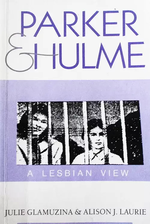 Parker & Hulme: a lesbian view (1991)
Parker & Hulme: a lesbian view (1991)by Julie Glamuzina and Alison J. Laurie
Through a pro-lesbian feminist lens, Julie Glamuzina and Alison Laurie describe the domestic, regional, and temporal sociopolitical context in which sixteen-year-old Pauline Parker, and her friend Juliet Hulme, murdered her mother, Honorah, in Christchurch, New Zealand in 1954.
This was the first non-sensationalist, 'academic' book publication about the murdercase.
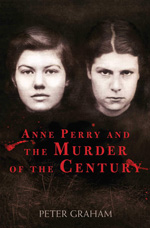 Anne Perry and the murder of the century (2011)
Anne Perry and the murder of the century (2011)[first published as 'So Brilliantly Clever']
by Peter Graham
"A comprehensive, well-researched examination not only of the crime and its aftermath but also of the killers’ lives, from childhood to the present day. Like a punctilious courtroom lawyer, [Graham] presents the facts and his analysis, leaving the final verdict to the reader." The Washington Post.
This is the book you should read if you would read only one book about the murdercase.
There's a link in the 'Links' section to a complete audiobook for 'So Brilliantly Clever', it's 345 pieces, so you can listen to it yourself.
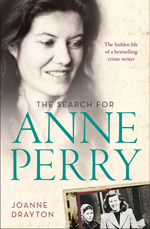 The Search for Anne Perry (2014)
The Search for Anne Perry (2014)by Joanne Drayton
Acclaimed literary biographer Joanne Drayton intersperses the story of Anne's life with an examination of her writing, drawing parallels between Anne's own experiences and her characters and storylines.
You could also say (and I quote):"The biography consists of endless long and tiresome reviews of Anne Perry's own books, so if you're not one of her loyal readers the biography will help you catch up what you've missed out." I have to agree with this one...
Books (fiction)
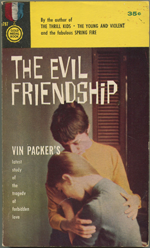 The Evil Friendship (1958)
The Evil Friendship (1958)by Vin Packer
[a pen name for Marijane Meaker]
Packer is seen as the inventor of 'lesbian pulp finction'. This book essentially is a trashy dime store novel, but it somehow took an interesting subject and made it banal. Parker and Hulme are reimagined as English schoolgirls, but the author had clearly never set foot in England, using blatant Americanisms on every page.
I haven't read it, can't say much more about it.
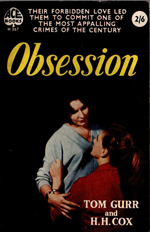 Obsession (1958)
Obsession (1958)by Tom Gurr and H.H. Cox
Novel inspired by the Parker Hulme murder case / Fictionalised account of the notorious 1954 New Zealand murder case. The central focus of Obsession is the Supreme Court trial, the arguments presented by legal counsel and the insanity defence. It has the hallmarks of a text inspired by Compulsion, a popular novelized account of the Nathan Leopold and Richard Loeb criminal trial in Chicago in the 1920s.
The authors first published an article about the real murdercase, entitled 'Death in a Cathedral City' in 'Famous Australasian Crimes (1957)', in which they state about Juliet Hulme (in 1957!): "...and it is possible that, under another name, the world in time will recognise a writer of talent."
Documentary
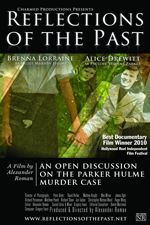 Reflections of the past (2010)
Reflections of the past (2010)by Alexander Roman
Roman's 90-minute documentary Reflections Of The Past, re-examines the gruesome details of how 16-year-old Pauline Yvonne Parker and 15-year-old Juliet Marion Hulme beat to death Parker's mother, Honora Mary Parker, on June 22, 1954. Roman, via a series of interviews with classmates, legal experts, psychiatrists, counsellors and authors on the subject, also tells a larger story; one of love, teenage delusion and incumbent arrogance, family dysfunction and a societal hysteria prompted by courtroom discussion of a possible lesbian relationship between the teenage girls.
See it if you can, it's has it's flaws, but it is worth your effort.
Movies
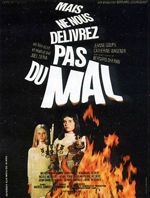 Mais Ne Nous Délivrez Pas du Mal / Don't Deliver Us From Evil (1971)
Mais Ne Nous Délivrez Pas du Mal / Don't Deliver Us From Evil (1971)by Joël Séria
Very loosely based on the notorious Parker/Hulme murder. In an idyllic rural French village, convent girls Anne (Goupil) and Lore (Wagener) find themselves gravitating to the more sinful side of things. This film seems to have been banned in France for a while. Some say it's teensploitation.
Viewer discretion is advised.
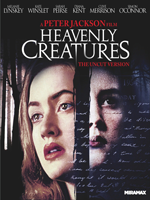 Heavenly Creatures (1994)
Heavenly Creatures (1994)by Peter Jackson
This still remains Peter Jackson’s chilling masterpiece, his most thrillingly inventive work, one that melds all of his many talents together in this brilliantly edited film, which is a mesmerizing portrait of two dizzyingly adolescent girls who are so disconnected and estranged from the world that they bond in an obsessively infatuating friendship that includes writing a novel together, where the world they write about intersects in their real lives, where the two find it hard to tell the two worlds apart, relying totally and exclusively on the friendship and love of the other, at the expense of all else, as their fragile connection to reality soon loses its hinges. Based on a real life event, Jackson brings it to life through the recreated script obtained from the meticulous diary entries of one of the characters (Pauline), where her exact words are used as much as possible. This is the film that introduces Kate Winslet to the world as Juliet, and she is in every sense of the word superb, as her free-wheeling independence and fertile imagination is what lays open the groundwork for the repressed, darker side of Pauline (Melanie Lynskey) to find expression in the real world. One of the best uses of opera music, so synonymous with emotional excess, in any film of recollection, as it so perfectly expresses that fractured schism, that hole in reality, in this case featuring the extraordinary talents of legendary tenor Mario Lanza as the ultimate image of male sexuality, but not in any real sense, only in a fantasized dream world, while Orson Welles, on the other hand, is despised by Juliet, calling him “It” and also “the most hideous man alive”.
If you have not seen this film, go see it immediately!
Are you still here? GO!!
Plays
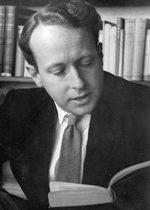 The Verdict (1955)
The Verdict (1955)by Bruce Mason
Written in 1955, in New Zealand, the year after the murder, Bruce Mason’s 'The Verdict' is a one act play that unfolds chronologically in a straightforward narrative. It had two performances at Unity Theatre, Wellington where its similarities to the recent Parker-Hulme case rendered Mason’s parallel story clear enough for the public to recognise.
Dealing with material within the recent aftermath of the murder trial, Mason made a dramaturgic, ethical and methodological choice to focus, not on the murderer, but on the behavioural responses and attitudes of the adults and authorities that prevailed at that time in Aotearoa New Zealand. The public appetite for coverage of the murder was great, but debating such appetite was deemed inappropriate, even the Communist Party newsletter described The Verdict “…as being in bad taste”
 Minor Murder (1967)
Minor Murder (1967)by Reginald Denham and Mary Orr
Australian play, loosely based on the Parker-Hulme case. The scene is a remote ranch in the Australian outback, where Shirley, a widow, lives with her teenage daughter, Margaret. Shirley has become disturbed by the intense relationship that has grown between Margaret and her friend, Carla, the child of her late foreman, who Shirley took in after her parents' death. To eliminate Carla's influence over Margaret, Shirley decides to send her daughter to boarding school and Carla to live with relatives. This plan leaves the girls devastated. Their bond is even more unhealthy than anyone suspected, and to avoid separation the girls coolly arrange to murder Shirley, charting each step so that it will appear to be an accident. at first, it is accepted by all, including Shirley's best friend, Patricia, and her attorney, Claude. But then, with growing horror the two grown-ups unearth small inconsistencies. To get at the truth, Patricia and Claude devise a strategy as clever as the crime itself, and painstakingly stalk their quarry, who outwit them at every turn until, in the final, chilling moments of the play, an ironic twist of fate causes them to become the means of their own undoing.
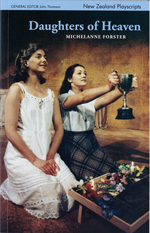 Daughters Of Heaven (1991)
Daughters Of Heaven (1991)by Michelanne Forster
The stage play is based on a murder in Christchurch in 1954 where teenagers Juliet Hulme and Pauline Parker were jailed for the murder of Parker's mother. The girls were said to have been in a lesbian relationship.
"There was a bit of everything on stage that night, from the absurd to the tragic, but it faithfully told the tale of two 15-year-old girls, obsessed with the likes of Mario Lanza and James Mason, their own complex fantasies and their need to be with each other, no matter what."
"A lot of the story is told by the (fictitious) Hulme family's housekeeper, Bridget O'Malley, played with credibility and gossipy outrage by Cathy Gribble, with the Crown Prosecutor (Alan Brown) often narrating from below the stage."
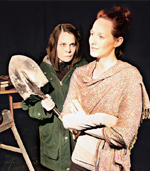 Folie à Deux (2010)
Folie à Deux (2010)by Trevor Schmidt
Shared madness. Folie à Deux crafts a fictional meeting between two true partners in crime.
The real Pauline Parker and Juliet Hulme haven't seen each other in decades. Not since the '50s. Schmidt's Folie à Deux, imagines such a meeting. The play's set in modern times, decades after the crime; Juliet's become a famous crime novelist under a new name (which is also true in real life; she built up quite a reputation as Anne Perry, though her real identity was eventually uncovered), while Pauline lives a somewhat more reclusive existence, teaching horseback riding at her own stable. And though the meeting is fictional, to the best of anyone's knowledge — though, as Schmidt points out, research has shown them to now live within 100 miles of each other in Northern Scotland — Schmidt has grounded his "what if?" theorizing in historical case-facts: Folie uses the girls' real names and nicknames, and direct quotes lifted from the journals and stories they wrote together—the pieces read aloud in court are still available as public record — and pretty much anything else Schmidt found fascinating about the case and could fit into his script.